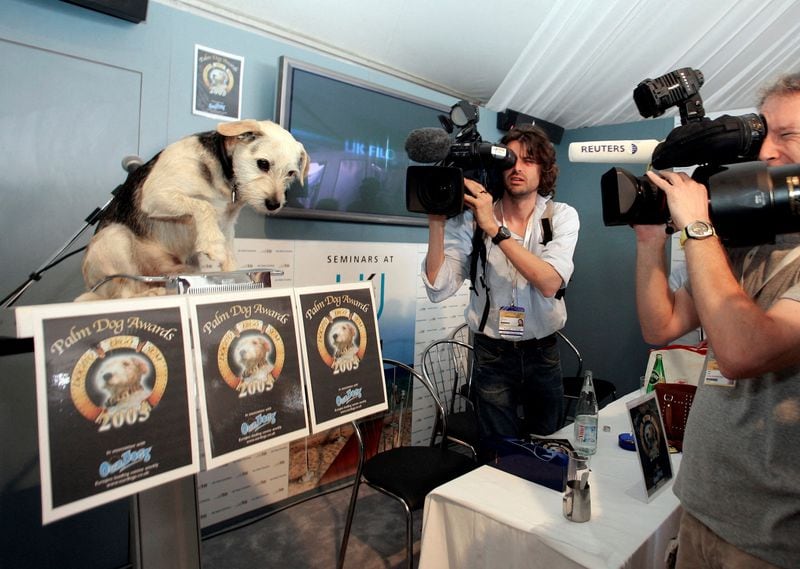Pets have become the third source of trafficking in France, after drugs and weapons. Thefts, abuse cases and seizures have exploded in recent years. Many French people walk their dog for fear of never seeing it again.
Nicolas walks through the Parisian district of Montmartre with a bucket of glue in his hand. He places a giant photo of his dog Bayou in each corner: a sign that says “Research” in red letters.
“I took it once when we went to the beach. Her heart-shaped spot is visible on her right side. I made 2,500 posters. They cost me around 1000 euros. The next step will be to print 3 by 4 meter billboards and place them along the highway. I want all of France to know that my dog is not with his masters,” he told RFI.
This is where he last saw Bayou. He shows on his mobile phone the photo of the man who took his dog, holding it by the leash. An image taken by a security camera. “My dog used to go off-leash. That day, I put him on and he ran away with the leash. The thief probably took him and took him away. We went to file a complaint with the police station,” he recalls.
Nicolas and his associate managed to locate the security cameras in the area. “We went store by store asking to see tapes showing the thief’s face. In one, a manager confirmed seeing him at 7:02 p.m. I begged the police to go and retrieve these images, but they gave me no answer.” A few days later, the police announced that they had closed the case due to lack of evidence.
Desperate, Nicolas decides to take charge of the investigation. With their friends and neighborhood neighbors, they began a search that led them to visit various neighborhoods in the capital.

“It is difficult to assume the reasons for the robbery because he is a mix of Creole breed and he is already 6 years old. He is not neutered, so they could use him for breeding, to excite the dogs of fight, to sell to people on online ad sites. Anything is possible. It’s very hard not knowing where he is.”
3,400 cases in 2022
In France, after drugs and weapons, pets are the third source of trafficking. The Animal Protection Brigade (BPA) is an association of volunteer police officers responsible for investigating and reporting cases of animal abuse and trafficking.
“Animals are sold for money. Races in particular are of great interest. The main victims of this traffic are dogs. We cannot trace the origin of a litter of puppies”, explains Nathalie, its president.
“Today, with the economic crisis, people are looking for new income. We have seen more and more individuals selling their own puppies on social networks, without identifying themselves as dog breeders,” he explains.
Animal trafficking has been multiplied by 10 in two years. It has gone from more than 330 in 2020 to more than 3,400 in 2022. There are networks of traffickers who import animals from Europe and North Africa to France. “There are people who took advantage of the war to get purebred dogs from Ukraine and bring them back. Besides dogs, there is a whole international trade in wild animals. All sorts of species pass through Spain to reach France,” points out Nathalie.

In the center of Paris, on the Ile de la Cité, there was a bird market every Sunday. An inn with hundreds of cages full of domestic and wild birds. The Paris Animals Zoopolis (PAZ) association has succeeded in obtaining a decision on its final closure in 2022.
“There were stalls without a license to sell, that is, they placed cages with birds without permission. There were also sellers who offered protected species in the trunk of their vehicle, the sale of which is prohibited in France. The authorities have seized, for example, goldfinches, a highly trafficked wild bird species, which is in danger of extinction”, explains Amandine Savinsens, founder of PAZ, an association which advocates “the pure and simple prohibition of any form of sale of animals” to RFI. .
Online commerce and traffic
In 2024 the sale of puppies and kittens in stores will be prohibited. This is what French legislators decided when they voted in 2021 on a law on animal abuse. RFI contacted several of these stores. All refuse to comment publicly on the effects this will have. The sector union has estimated that at least 50 of them will close due to the new legislation and 100 will be economically weakened.
However, parliamentarians argued that 80% of pets are sold online. Although they did not ban online trading, they did impose restrictions on sales, such as certificates and ID numbers, limitations to one litter per year of specific breeds, and veterinary certificates.
North of Paris, in the commune of Gennevilliers, is one of the 60 shelters of the French Society for the Protection of Animals (SPA). They receive all kinds of abandoned or seized domestic animals there, to find them a family.
In one of the cages lives Taiga, a dog that was part of a litter seized in the French archipelago of Mayotte. “They told us that they had been seized from criminals who were organizing fights. They were very thin and scared. They explained to us that in this region of the Indian Ocean, people do not walk their dogs for fear that they will be stolen,” says Julie Rojo, manager of the shelter.
According to her, there are breeds that are of more interest to trafficking networks than others, such as Pitbulls or Staffordshire Bull Terriers. What in France are called “first category” dogs, which can be considered dangerous. “People buy them without knowing that they require specific care and are unable to take care of them. In turn, they sell them to someone else, who can use them for breeding or for combat,” Rojo laments.
The SPA asks certain requirements for people who wish to adopt their animals, such as “identity documents, address, income and criminal record”. Even so, Julie Rojo says no one is immune to ending up in the wrong hands.
happy reunion
The story of Nicolas and his stolen dog made the rounds on social networks in France. After participating in a television show, he receives a message from a woman. He reported seeing Bayou with two people on a commuter train. Nicolas alerted the police and a few hours later, he was able to see Bayou again.

Authorities failed to catch the thief as he handed the dog over to a third party who had not been involved in the theft and then disappeared. Nicolas never knew why he took his dog. Now he and his friends seek to improve the justice system’s handling of these cases.
“We want to reform the processes, educate the police so that they represent the animal cause in the police stations. It’s the details, like stopping to quickly close cases under the pretext that there is no new evidence”, he says and adds: “We were very lucky.”
Source: Latercera
I’m Rose Brown , a journalist and writer with over 10 years of experience in the news industry. I specialize in covering tennis-related news for Athletistic, a leading sports media website. My writing is highly regarded for its quick turnaround and accuracy, as well as my ability to tell compelling stories about the sport.


